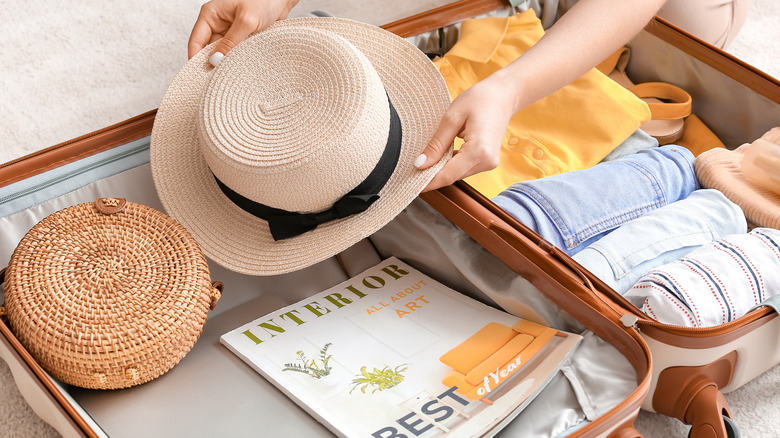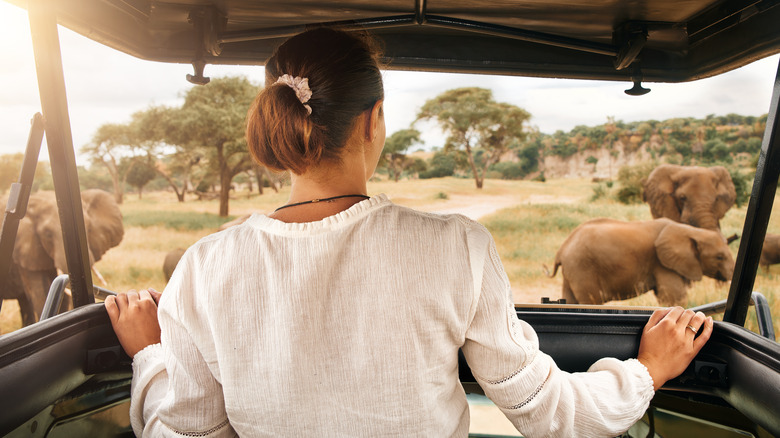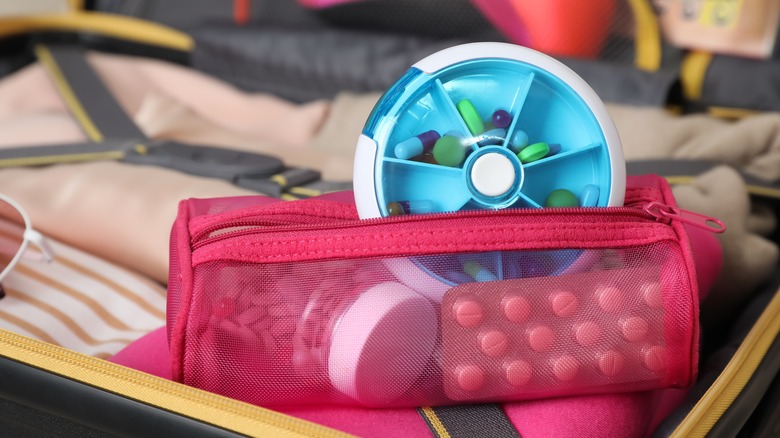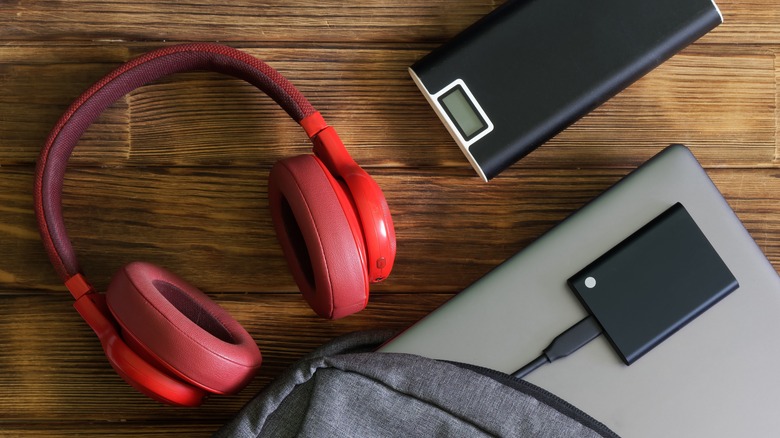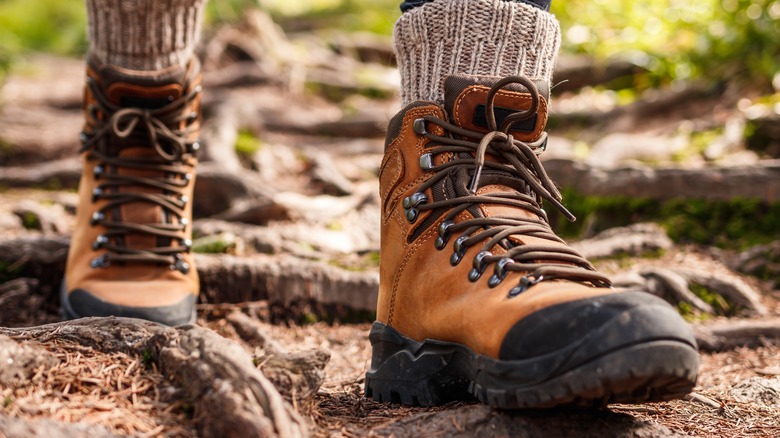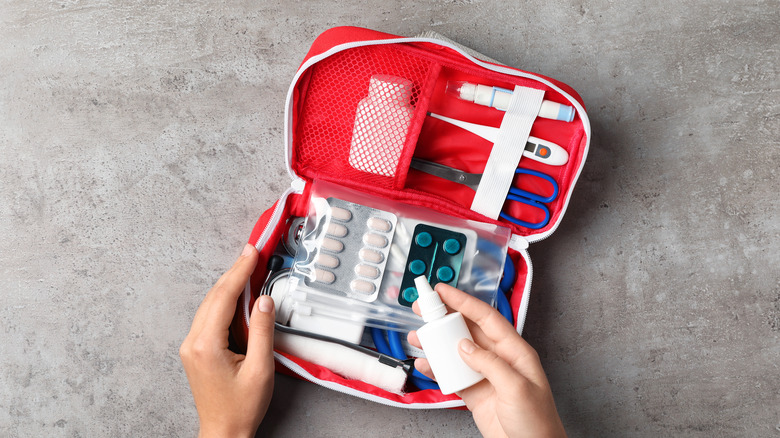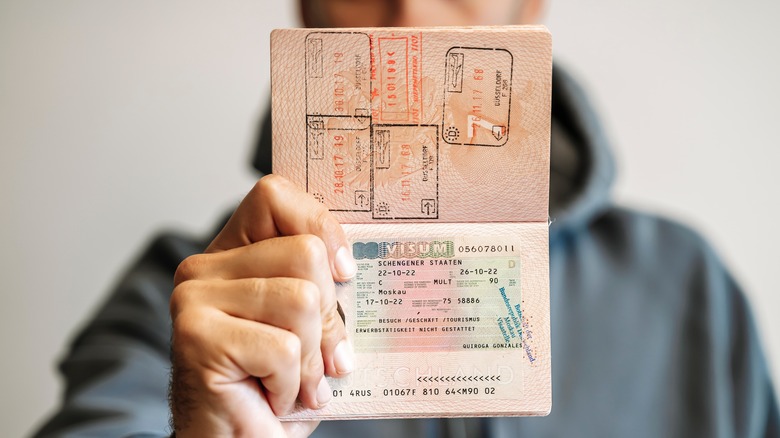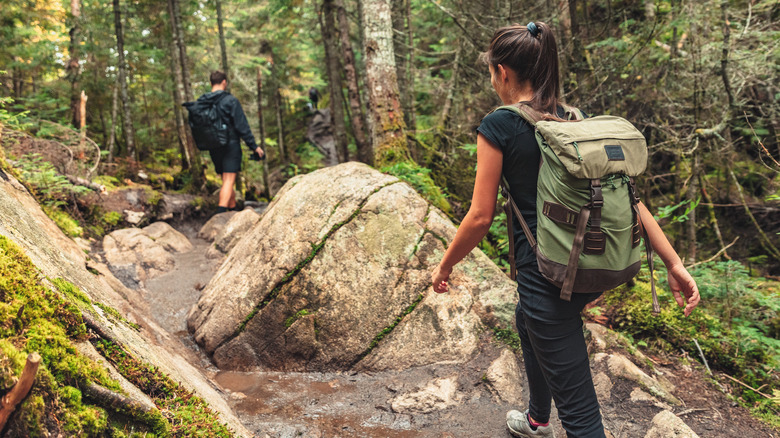Here's What You Should Pack For Your First African Safari
Congratulations! You're about to make one of your wildest dreams come true. The African safari you've been waiting for all your life is around the corner, and all you can think about is exploring an unspoiled environment, watching glorious animals protecting their territories, getting lost in the wilderness, and imagining how your adrenaline will pump hard when the unexpected happens. From gorilla trekking in Rwanda, camping in a game reserve, and taking first-hand photos of the Big Five animals in Kenya to exploring magnificent national parks in South Africa, an African safari offers an experience to die for. As one Reddit user noted, "It is well worth getting into the wilds ... Something pretty special about walking through the wild and hearing a lion roar in the distance or watching hippos play in the water in front of your tent!"
However, you're probably filled with a cocktail of emotions because you aren't sure if you have prepared adequately for your first safari. Some scary thoughts still creep in because it will be a new experience. Suppose you forgot to pack any gadget and you've lost direction in the heart of a forest. Or perhaps, you want to explore rugged terrains to see elephants, but the only footwear you have is a pair of sandals.
Undoubtedly, failing to pack properly can easily ruin your safari. But fret not, because this detailed packing guide will ensure that your first African safari becomes a success.
Pack adequately for hot and cold weather
When it comes to listing the hottest continents, Africa wins by a landslide, and that can easily mislead you into packing for hot weather only. Although you'll hardly encounter snow (unless you travel to South Africa and climb Mount Kilimanjaro or the Atlas Mountains), you still need to create some space for a fleece jacket, scarf, hoodie, or waterproof jacket (via World Atlas). Apart from rain, some parts like the Kenyan highlands can be quite cold at night or in the morning (per Safari Bookings). Imagine spending the night in a tented camp at such places, only to shiver with cold because you forgot to pack some warm clothing.
Carrying lightweight clothing might sound obvious until you get into the intricacies. For instance, you need to be careful about the colors you choose to ensure you not only blend with the environment, but also don't absorb much heat. You can never go wrong by choosing neutral colors such as brown, jungle green, and beige. Say goodbye to those white and black outfits or the brightly colored ones (per African Budget Safaris). Now that you know which colors to choose, some light clothes you can pick for a comfortable safari experience are khaki trousers and shorts, cargo pants, a swimsuit, a light skirt, long-sleeve blouses, a maxi dress, a denim shirt, jumpsuits, and vests (via The Blonde Abroad).
Keep your toiletries close
You don't want to find yourself in an awkward situation where you desperately need to take a shower because you're all sweaty after a day jam-packed with adventures, but you lack the means to clean up. This can easily be your situation if you decide to spend several nights in a tented camp where you only have access to water in a nearby river.
So what do you do to ensure you aren't caught by surprise? Well, some of the toiletry items that should be in your bag are soaps, sanitary products, combs, toothpaste, moisturizers, shaving cream, oil/lotion, and razors, just to mention a few (per The Travel Fashion Girl). Perhaps most importantly, you need deodorant, because sweat will be your loyal companion as you trek for miles or climb mountains.
Not to bring back Covid-19 restrictions, but you seriously need a hand sanitizer, too. Hunger might strike you in the middle of an excursion, and you may not be able to find a place where you can sit down and eat. That's where those snacks you carried will come in handy, and you'll need to sanitize your hands before you start snacking (since you may not have the luxury of using your drinking water for hand-cleaning purposes). If you don't want to settle for the basics, some optional toiletries you can include are lip balm, hair styling products, toilet paper, tweezers, wet wipes, and shampoo (via Safari Soles Tours).
Pack some preventative pharmaceuticals
It's better to be safe than sorry, so in addition to your medical insurance and vaccination, you'll want to pack some over-the-counter medication as well.
Suppose you've sampled a bunch of yummy street foods, but you're restless because you've started suffering from traveler's diarrhea. This kind of illness may sometimes occur as a result of drinking contaminated water (per Mayo Clinic). If it's your first time in a foreign land, you may not know the exact places to eat food prepared by professionals. Packing anti-diarrhea medicine or seeking your doctor's advice on the most effective antibiotic you can carry is a wise decision (per African Budget Safaris).
Africa features many malaria-endemic regions such as the Okavango Delta, so you're at high risk of suffering from the disease. Before you set foot in malaria-prone areas, consult a physician to know the kind of antimalarial medication suitable for you. Some examples are Malarone and Lariam, which have different dosages (via Completely Unique Safaris). Change in climate can sometimes take a toll on you, leading to headaches, so pack some painkillers. Other pharmaceuticals you can carry include antihistamines, cough drops, antacids, mild sedatives, and motion sickness medicines (per Center for Disease Control and Prevention). Thezeetree on Reddit stated, "I always bring some azithromycin for travelers' diarrhea."
Carry these handy travel gadgets
If you're one of those travelers who suffer from aerophobia, you may want to do anything as long as it distracts you from the reality of flying. You may want to listen to some soothing music to help you zonk out, and that's where headphones will come to your rescue.
It doesn't end there, though: You'll likely need some form of entertainment while camping, so your smartphone or iPod will do the job. You may also need binoculars and a camera to fully appreciate the beauty of the wild animals you'll see with your own eyes for the first time. Moreover, you might dive so deep into exploring the jungle that you forget how to get back to your hotel. What happens if you get lost and there's no internet coverage to check Google Maps? If you have a GPS device with you, there's nothing much to worry about.
Also, the importance of carrying a power bank can't be overemphasized, because your phone, iPod, or any other portable gadget may run out of juice when you need it badly. For maximum comfort and enjoyment, you can pack flight earplugs, a laptop, a universal adaptor, or a portable fan (via Hello Magazine). According to USA Today, Tile trackers and Apple Airtags are helpful gadgets that can help trace your luggage, so invest in them to easily find your belongings in case they get lost.
Get the right sun protection
If you've never been close to the equator, this is a golden opportunity for that experience. Note, though, that the sun will be harsher than what you're used to in other continents, such as Europe. This means that your skin hasn't adapted to this level of exposure to strong UV rays, leading to sunburns that can easily ruin your selfies.
To keep your skin looking great, you need to apply sunscreen after every couple of hours. A reviewer on Trip Advisor states, "I wouldn't ever wear anything less than factor 30 ... Makes me laugh watching people fry themselves with less than factor 25 when they've not really been to Africa or the Tropics before."
Alternatively, you can wear a hat with a breathable fabric, because the shade it creates can be a lifesaver when the sun is too hot. To complete your sun protection measures, you'll need a pair of dark sunglasses because your eyes may also suffer sun damage. Plus, you wouldn't want to strain them while watching wild animals (via The Safari Store). Last but not least, wear lightweight trousers and long-sleeved t-shirts to protect other parts of your body.
Take different types of shoes with you
A safari may feel incomplete if you don't hit the ground to explore the stunning landscape, and the wrong choice of shoes can make or break this experience.
We understand that shoes can occupy an annoyingly large space in your bag, but you just can't do without them during an African safari trip. For starters, pack at least one pair of hiking boots if you can't wait to conquer muddy forests and other rugged terrains. A good pick should have a grippy rubber sole to avoid slipping. Since you won't be spending all your time on a safari, you'll eventually need to relax at a hotel or go swimming; in such cases, your sandals and sneakers will get the job done (per The Safari Store).
Kenyan Girl on Reddit notes, "I'm from Kenya so hopefully I'll be able to give some advice ... get thick soled boots. Acacia tree thorns are really tough and can penetrate shoes so be careful! A common brand I see tourists wearing is Bata Safari boots."
Pack a first aid kit
An African safari is typically brimming with adventure, and you can't be sure what the day might throw your way. From a heart-throbbing gazelle hunt to an up-close encounter with a majestic elephant, the savanna holds a plethora of surprises — and not all of them will be delightful. It's possible to get a bump here or a bruise there as you experience the wild African terrain, which means packing a first-aid kit is always a good idea.
You don't really need anything too fancy in your first aid kit, just the basics. For starters, make sure it has a couple of bandages of various sizes, so you can cover any bruises or cuts you might get along the way. Antibacterial wipes or alcohol-based hand sanitizers are also a must-have to help disinfect potential wounds before dressing them. Adhesive tape may also be a great idea to carry along to help keep any gauze in place. You might also want to pack some water purification tablets in case your drinking water runs out in the middle of your excursion, forcing you to chug down some not-so-clean river water (via Johns Hopkins Medicine).
Have cash at all times
Ah yes, the convenience of swapping a credit card is a luxury you're probably used to by now. You have to admit, cash payments are slowly starting to become rather archaic as the world embraces contactless modes of payment. Here's the thing, though: That credit card you've grown to love and cherish might not be readily acceptable in some of the places you visit. Sure, you'll find some major lodges and stores accepting card payments, but it's not always guaranteed. That's why having cash on you is so important.
Regardless of where you're going, it's always wise to convert your cash to the local currency. You might find some lodgings or campsites that accept international currency, but again, some might not. So before you embark on your safari, be sure to do a search on some reputable local banks where you can get currency exchange services. Also, outside of major cities, ATMs are a rarity, so carry as much cash as you'll need. Another plus to having cash in hand is that you can easily grab souvenirs along the way without the hassle of worrying about card payments being declined (via Africa Travel Resource).
Keep hard copies of your vital travel documents
With the 21st century came the revolutionary convenience of cloud storage. Now, with a few taps of your screen or a couple of clicks, all your documents can rest in the safety of a remote database. While this is undeniably a great way to keep your precious documents stashed safely, it does have its drawbacks at times, especially when there's poor internet connectivity.
As you're planning your first African safari, don't rely solely on soft copies of your travel documents, because accessing them might prove rather tricky at times. After all, you can't always be certain that the place you're traveling to has adequate internet infrastructure. While you might be used to the joys and thrills of 5G, some places you visit hundreds of miles from major cities might not offer the same convenience.
It's also a smart idea to bring hard copies of your passport, national ID card, and travel visa with you. Some countries have extra entry requirements such as yellow fever vaccination certifications, so be sure to do your enough research before you travel, and get the necessary documentation. You'll also want to bring a hard copy of your travel insurance with details of your emergency contacts, just in case. Don't forget to double check all the entry requirements of a country you intend to visit, to make sure you abide by all their regulations (via IATA).
Pack these types of bags for maximum convenience
Truth be told, you'd be better off steering clear of anything that might be too bulky. One thing you should be aware of: baggage weight limits range between 33 pounds in East Africa and 44 pounds in Southern Africa (per Aardvark Safaris). Therefore, you want to strike the right balance between functionality and weight to ensure you enjoy a seamless holiday experience. Since you need to pack light, go for a bag that easily holds all your clothing, gear, and a couple of other accessories. A lightweight, weather-proof bag ensures you adhere to the weight limits while also keeping all your belongings safe, regardless of the weather conditions.
Foldable leather duffel bags are an excellent option, since they are flexible, easy to carry, and durable. Their straps offer excellent convenience for bringing your bag around as you go about your daily safari activities. If you're more of a backpacker, you won't go wrong with an adventure bag with shoulder straps. That way, you can easily hoist your luggage onto your back for easier transportation, especially if you'll be doing a lot more camping than lodging. You may also want to go for a bag with plenty of compartments and pockets to conveniently fit all your belongings. Lastly, a fanny pack would be a great addition for carrying a few essentials like your wallet, a power bank, sunglasses, and even a couple of snacks for the road (via TheWorldPursuit).
